- Home
- Iain Banks
Walking on Glass
Walking on Glass Read online
Walking on Glass
Iain Banks
Graham Park is in love. But Sara Ffitch is an enigma to him, a creature of almost perverse mystery. Steven Grout is paranoid - and with justice. He knows that They are out to get him. They are. Quiss, insecure in his fabulous if ramshackle castle, is forced to play interminable impossible games. The solution to the oldest of all paradoxical riddles will release him. But he must find an answer before he knows the question.
Park, Grout, Quiss - no trio could be further apart. But their separate courses are set for collision...
"A feast of horrors, variously spiced with incest, conspiracy, and cheerful descriptions of torture... fine writing" The Times
"The author's powerful imagination is displayed again here every bit as vividly as in his debut" Financial Times
"Establishes beyond doubt that lain Banks is a novelist of remarkable talents" Daily Telegraph
Walking on Glass
Iain Banks
PART ONE
THEOBALD'S ROAD
He walked through the white corridors, past the noticeboards with their offers of small rooms and old cars, past the coffee bar where people sat at tables, past a hole in the white floor where an old chair stood sentry over an opened conduit in which a torch shone and a man crawled, and as he left he looked at his watch:
TU 28
pm
3:33
He stood on the steps for a second, smiling at the figures on the face of the watch. Three three three. A good omen. Today was a day things would come together, a day events would coalesce.
It was bright outside, even after the painted lightness of the marble-flaked corridor. The air was warm, slightly humid but not sultry. The walk would be a pleasure today. That was good too, because he didn't want to arrive at her place hot and flustered; not today, not with her at the end of the walk, not with that subtle but unequivocal promise there, waiting, ready.
Graham Park stepped out on to the broad grey pavement outside the School and during a break in the traffic jogged across Theobald's Road to its north side. He relaxed to a walk on the pavement outside the White Hart pub, his large black portfolio held easily at his side by its single handle. Drawings of her.
He looked up at the sky, above the blocks and squat towers of the medium-rise office blocks, and smiled at its blue, city-grimed segmentings.
Everything seemed fresher, brighter, more real today, as though all his quite normal, perfectly standard surroundings had until this point been actors fumbling behind some thin stage curtain, struggling to get out, but now stood, triumphant expression frozen on face, hands spread, going Ta-Raah!" on the boards at last. He found this young-love rapture almost embarrassing in its intensity; it was something he was delighted to have, determined to hide, and wary of examining. It was enough to know it was there, and the very commonness of it was reassuring in a way. Let others have felt this way, let them feel it now; it would never be exactly like this, never be identical. Revel in it, he thought, why not?
A worn and grubby old man stood with his back against the wall of another tall grey-and-brickred building. He wore a heavy grey-green coat, even in that heat, and one of his shoes was open at the toe, baring skin inside. He held two huge boxes of mushrooms. It was the sort of sight - the poor, the strange - which usually alarmed Graham.
So many strange people in London. So many of the poor and the decrepit, the still spinning shrapnel, walking wounded of society. Usually they oppressed and threatened him, these people with little threat to offer, and much to fear. But not today; today the old man, hot in his thick coat, blinking from his grey face, clammy hands round his two two-pound boxes of mushrooms was merely interesting, just a possible subject for a drawing. He passed the Post Office, where a young black man, tall and well dressed, stood talking quietly to himself. Again no fear. He realised that maybe he really was after all, just a little, the country hick he had tried so hard to avoid being. He had been so determined to be ungullible, city-wise that perhaps he had gone too far in the other direction, and so read a threat in everything the big city had to offer. Only now, with the promise of the strength she might give him, could he afford the luxury of thinking so closely about himself (you had to have armour in the city, you had to know where you stood).
He had opted for the cynical, guarded approach, and now he could see that for all the safety it had brought him - here he was, in his second year, still solvent, heart intact, unmugged and even succeeding in his studies, despite all his mother's fears - every defence had its price, and he had paid in a separating distance, incomprehension. Perhaps the young black man was not mad; people did talk to themselves. Perhaps the old man with the torn shoe was not some desperate down-and-out with fists full of stolen mushrooms; maybe he was just an ordinary person whose shoes had split that lunchtime, while shopping. He looked at the traffic roaring by, and over it through railings at the leafy greenness of Gray's Inn, edging into view on his right. He would remember this day, this walk. Even if she did not... even if all his dreams, his hopes did not... ah, but they would. He could feel it.
"Put that fantasy down. Park, you don't know where it's been."
He turned quickly to the voice and there was Slater, bounding down the steps of Holborn Library, wearing a pair of one-and-a-half-legged jeans, with a shiny black shoe on one foot and a knee-length boot on the other; the jeans were cut to suit, so that one leg ended normally, in a stitched hem over the shoe, while the other leg came to a frayed stop just above the top of the boot. Above, Slater sported a well-worn hacking jacket over a black shirt and a black bow tie which appeared to have lots of small, dull red stones set in it. On his head sat a tartan cap, predominantly red. Graham looked at his friend and laughed. Slater responded with a look of pretended chilliness. "I see nothing to cause such hilarity."
"You look like -" Graham shook his head and waved one hand at Slater's jeans and footwear, and spared a glance for his cap.
"What I look like," Slater said, coming forward and taking Graham by the elbow to continue walking, "is somebody who has discovered an old pair of RAF pilot's boots at a market stall in Camden."
"And taken a knife to them," Graham said, looking down at Slater's legs and shrugging his arm free of the light grip which held it.
Slater smiled, put his hands in the pockets of his mutilated jeans. "There you show your ignorance, young man. If you had looked carefully, or if you knew enough, you would appreciate that these are, in fact, specially designed pilot's boots which, with the aid of a couple of zips, convert into what was doubtless, in the forties, a pretty neat-looking pair of shoes. The whole point is that if the intrepid aviator got shot down while blasting Gerry out of the skies above enemy territory, he could simply unzip his boot-legs and have a pair of civilian-looking shoes on his feet, and thus pass for a native and so escape those dreadful SS men in their tight little black uniforms. I have merely adapted -"
"You look silly," Graham interrupted.
"Why you straight old straight," Slater said. They were walking slowly now; Slater never liked to rush. Graham was only a little impatient, and he knew better than to try to hurry Slater up. He had left in plenty of time, there was no hurry. More time to savour. "I just don't know why you turn me on at all," Slater said, then peered closely at the other young man's face and said pointedly, "Are you listening to me, Park?"
Graham shook his head, grinning slightly, but said, "Yes, I'm listening. You don't have to camp it up with me."
"Oh my God, pardon me," Slater said melodramatically, one hand fanned over his upper chest, "I'm offending the poor hetero boy. Under twenty-one as well; oh say it ain't so!"
"You're a fraud, Richard," Graham said, turning to look at his friend. "I sometimes think you aren't
even gay at all. Anyway," he went on, attempting to increase their pace a little, "what have you been up to? I haven't seen you around for a couple of days."
"Ah, the change-of-subject," Slater laughed, staring ahead. He grimaced and scratched his short, curly black hair where it stuck out from under his tartan cap. His thin, pale face contorted as he said, "Well, I shan't go into the seamy details... the more basic facets of life, but on a cleaner if more frustrating theme, I have been trying to seduce that lovely Dickson boy over the last week. You know: the one with the shoulders,"
"What," Graham said contemptuously, annoyed, "that tall bloke with the bleached hair in first year? He's thick,"
"Hmm, well," Slater said, bobbing his head in an arc - a gesture somewhere between a nod and a shake - "thick set, certainly, and not awfully bright, but God those shoulders. That waist, those hips! I don't care about his head; from the neck down he's a genius,"
"Idiot," said Graham.
"Trouble is," Slater mused, "he either doesn't realise what I'm up to, or he doesn't care. And he has this awful friend, called Claude... I keep telling him how earthy I think he is, but he hasn't got it yet. Now he really is thick. I asked him what he thought of Magritte the other day, and he thought I was talking about some girl in first year. And I can't get him away from Roger. I shall die if he's gay. I mean if he got there first. I'm sure Roger isn't really stupid, it's just his friend who's infectious,"
"Ha ha," Graham said. He always felt slightly uncomfortable when Slater talked about being gay, though his friend was rarely specific, and Graham was hardly ever directly involved - he had, for example, only ever met one of Slater's (supposedly many) lovers, at least as far as he knew.
"Do you know," Slater said, suddenly brightening, as they crossed John Street, "I've had this really good idea."
Graham gritted his teeth: "Well, what is it this time? Another new religion, or just a way of making lots of money? Or both?"
"This is a literary idea."
"If it's The Sands of Love, I've already heard it."
That was a great plot. No, it isn't romantic fiction this time." They stopped at the corner of Gray's Inn Road, waiting for the lights to change. A couple of punks on the far side, also waiting to cross, were pointing at the oblivious Slater and laughing. Graham looked up at the skies and sighed.
"Imagine, if you will," Slater said dramatically, sweeping his arms out wide, "a -"
"Keep it short," Graham told him.
Slater looked hurt. "It's a sort of Byzantine future, a degenerate technocratic empire with -"
"Oh, not science fiction again."
"Well, no, it's not really, smart-ass," Slater said. "It's a... fable. I could make it a fairy-tale instead, if I wanted to. Anyway. It's the capital of the empire; a courtier starts a liaison with one of the princesses; the demands she and the Emperor make on his time get to be too much, so he secretly has an android made to impersonate him at the endless court rituals and boring receptions; nobody notices. Later he has the android's brain upgraded so it can cope with hunting expeditions and personal meetings, even Cabinet discussions with the Emperor present, all so that he can spend more time dallying with the princess. But he gets killed in some over-energetic love-play. The android continues to fulfil all its courtly duties and even becomes a trusted confidant of the Emperor, and the princess discovers it actually makes a better lover than the original. The android can fit in all its commitments because it never has to sleep. But it develops a conscience, and has to tell the Emperor the truth. The Emperor smiles, opens up an inspection panel in his chest and says, 'Well, by a funny coincidence...' End of story. Pretty good, eh? What do you think?"
Graham took a deep breath, thought, then said. "These pilots: so they could disguise their boots. What about their uniforms?" He frowned seriously.
Slater stopped, a look of horror and confusion on his face. "What?" he said, aghast.
Suddenly Graham realised - with a small, disquieting feeling in his stomach - that they were standing right outside a place which always made him feel apprehensive.
It was only a small picture-framing shop which sold prints and posters and more-tasteful-than-average lampshades, but it was the name which held unpleasant associations for Graham: Stocks. That name chilled him.
Stock was his rival, the great threat, the cloud hanging over him and Sara. Stock the biker, the macho black-leathered never-properly-seen image of Nemesis. (He had looked up the name in the London telephone directory; there were one-and-a-half columns of them; enough for quite a few coincidences, even in a city of six-and-a-half million people.)
Slater was saying, "- to do with it?"
"It just occurred to me," Graham said defensively. He wished now he hadn't decided to tease Slater.
"You haven't listened to a word I've said," Slater gasped. Graham nodded to indicate they should keep on walking.
"Of course I have," he said. They passed Terry's fruitstall next, with its smell of fresh strawberries, then a chemist's. They were at the junction of Clerkenwell Road and Rosebery Avenue. By the side of Gray's Inn Buildings, which led on up the Avenue, some tall green wooden hoardings jutted out over part of the street and pavement, shielding some roadworks. Graham and Slater walked down the narrow alley formed by the seedy, decaying stonework and the painted wood; Graham saw the grimy glass of cracked windows; fading political posters flapped in a slight breeze.
"But don't you think it's a laugh?" Slater said, trying to edge round Graham to peer into his face. Graham avoided his friend's eyes. He wondered if Slater intended to walk the whole way with him, or whether he was only going as far as the Air Gallery, now only just across the street, where he sometimes went in the afternoons. Graham didn't mind Slater knowing about Sara - he had introduced them to each other, after all - but he wanted to keep this day private. Besides, he got embarrassed at the stares people gave Slater, even if Slater himself didn't seem to notice. The least he could do, Graham thought, was take off that ridiculous tartan cap.
"It's... all right," he conceded as they came out from between the decaying buildings and the green hoardings, "but..." he smiled and looked at Slater, "don't give up your day job."
"And don't you quote my own lines back at me, you young pup!"
"Okay," Graham said, looking at Slater again. "Stick to ceramics."
"You make me sound like a glaze."
"That's your expression."
"Oh-ho," Slater said, "well, touche, or toushe, anyway." He stopped by the pedestrian crossing which led over Rosebery Avenue to the square, red-brick building of the Air Gallery. Graham turned to face him. "But don't you like the latest scenario?"
"Well," Graham said slowly, deciding he had better say something nice, "it's good, but perhaps it needs a little work."
"Huh," Slater said, stepping back and rolling his eyes. He came forward again, eyes narrowed, pushing his face close to Graham's so that the younger man shrank back just a little." 'A little work', eh? Well, bang goes your commission from the National Portrait Gallery when I'm famous."
"Are you going over there?" Graham indicated the far side of the road.
Slater slouched a little and nodded, looking over the road to the gallery.
"I suppose so. You're trying to get rid of me, aren't you?"
"No I'm not."
"Yes you are. You've been hurrying me all the way."
"No, I wasn't," Graham protested. "It's just that you walk slowly."
"I was talking to you."
"Well, I can walk and listen at the same time."
"Oh, wow, the Gerry Ford of the Art School. Anyway, not to worry; I bet I know where you're off to, hmm?"
"Oh?" Graham said, trying to look innocent.
"Yes, I can tell," Slater said. "Stop trying to look so damn nonchalant." A smile appeared on his face like oil surfacing on still water. "You've got the hots for our Sara, haven't you?"
"Oh, intensely," Graham said, trying to over-play it; but he could see Slater wasn't ta
ken in. But it wasn't like that; it wasn't that crude, or even if it was it shouldn't be talked of in such a way; not now, not yet.
They aren't worth it, kid," Slater said, shaking his head sadly and wisely. "She'll let you down. Later if not now. They always do."
Graham felt happier with this direct assault; this was just gay misogyny, not even genuine at that, but another of Slater's roles. He laughed and shook his head.
Slater shrugged and said, "Well, when it does go wrong, at least you know you can come running to me." He patted his right shoulder with his other hand. "I have very good shoulders for crying on."
"Not," Graham laughed, "while you're wearing that cap, chum." Slater narrowed his eyes and straightened the tartan cap on his head. "Well," Graham went on hurriedly, "I really have to go now," and took a couple of steps backwards.
"All right, then," Slater sighed wistfully. "Do all the things I wouldn't dream of doing, but don't forget what your Uncle Richard told you." He grinned, blew Graham a kiss, waved one hand, then stepped on to the crossing during a lull in the traffic. Graham waved back, then walked away. "Graham!" Slater called suddenly from the other side of the road. He turned to look, sighing.
Slater stood outside the gallery, in front of one of its large windows. He put one hand in his jacket pocket, and as he did so his bow tie lit up; the small red stones were really lights. They flicked on and off. Slater started laughing as Graham shook his head and walked away up Rosebery Avenue. "A quick flash!" Slater bellowed in the distance.
Graham laughed to himself, then had to break his stride as a long-haired biker in dirty denims bumped a large Moto Guzzi across the pavement in front of him and into the courtyard entrance of the buildings called Rosebery Square. Graham looked darkly at the man pushing the bike, then shook his head, telling himself not to be so stupid. The man looked nothing like Stock, the bike was quite different from the big black BMW Stock rode, and anyway omens were nonsense. Stock's time was over; he could tell that from what Sara had said over the phone that morning.

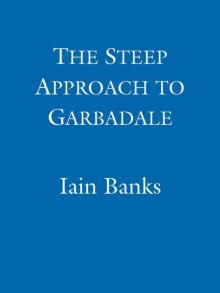 The Steep Approach to Garbadale
The Steep Approach to Garbadale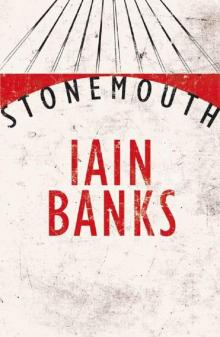 Stonemouth
Stonemouth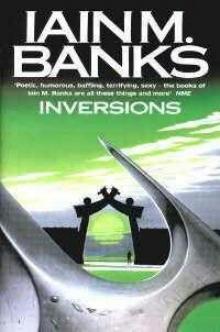 Inversions c-6
Inversions c-6 Raw Spirit: In Search of the Perfect Dram
Raw Spirit: In Search of the Perfect Dram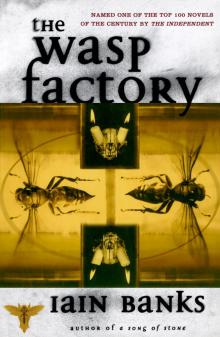 The Wasp Factory
The Wasp Factory Raw Spirit
Raw Spirit Walking on Glass
Walking on Glass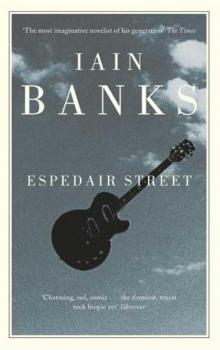 Espedair Street
Espedair Street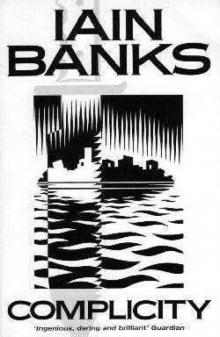 Complicity
Complicity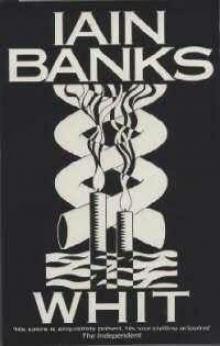 Whit
Whit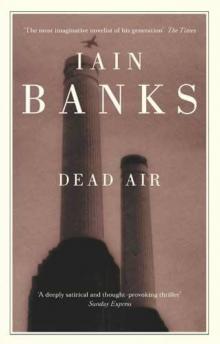 Dead Air
Dead Air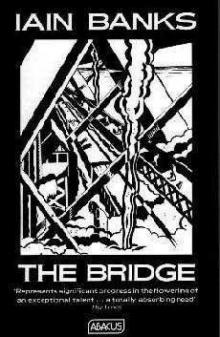 The Bridge
The Bridge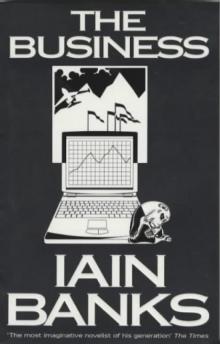 The Business
The Business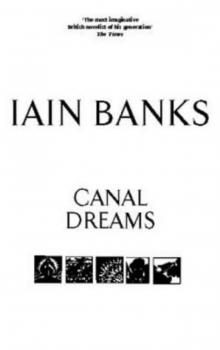 Canal Dreams
Canal Dreams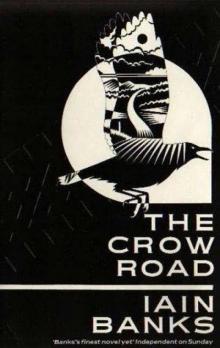 The Crow Road
The Crow Road